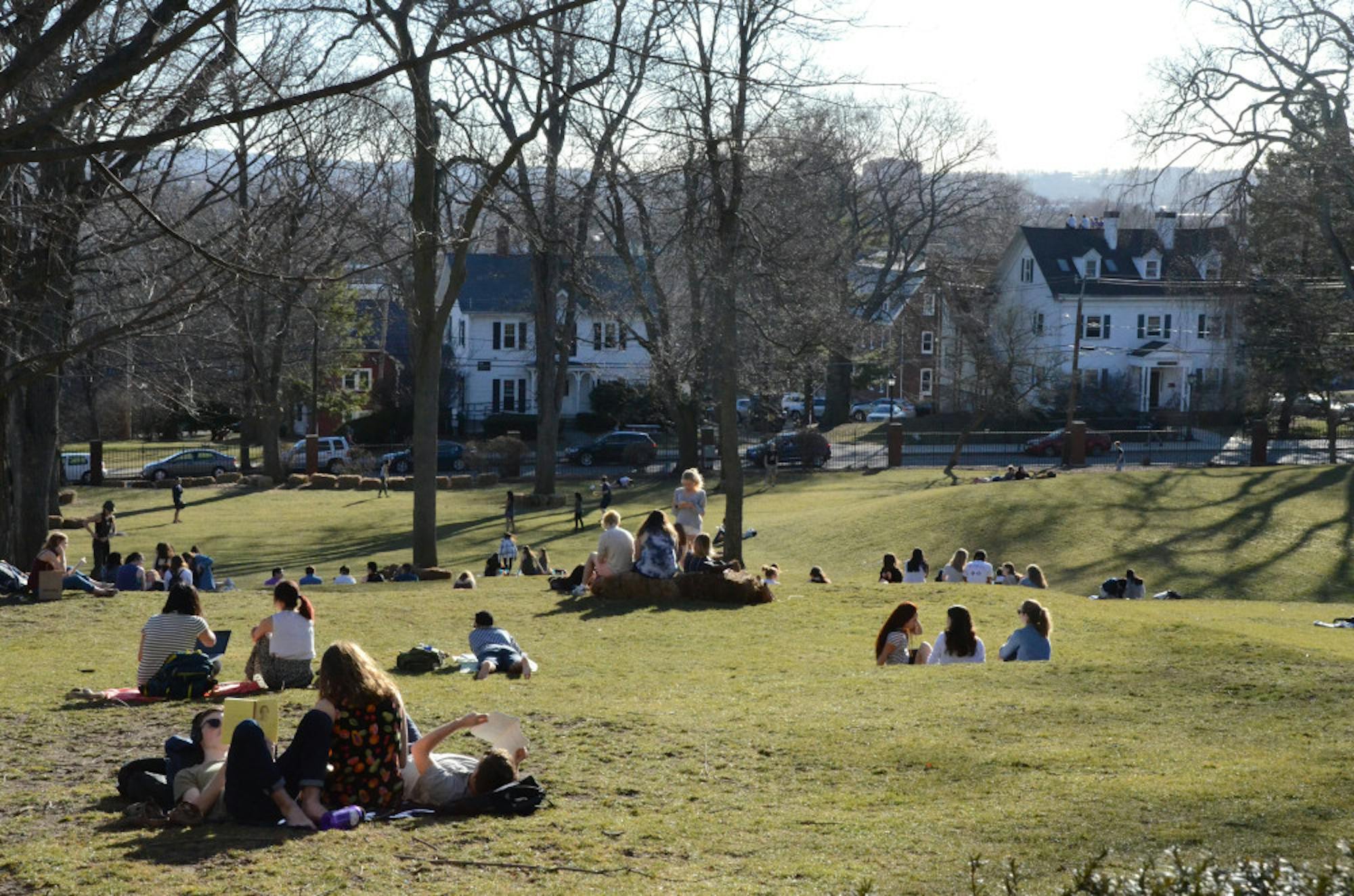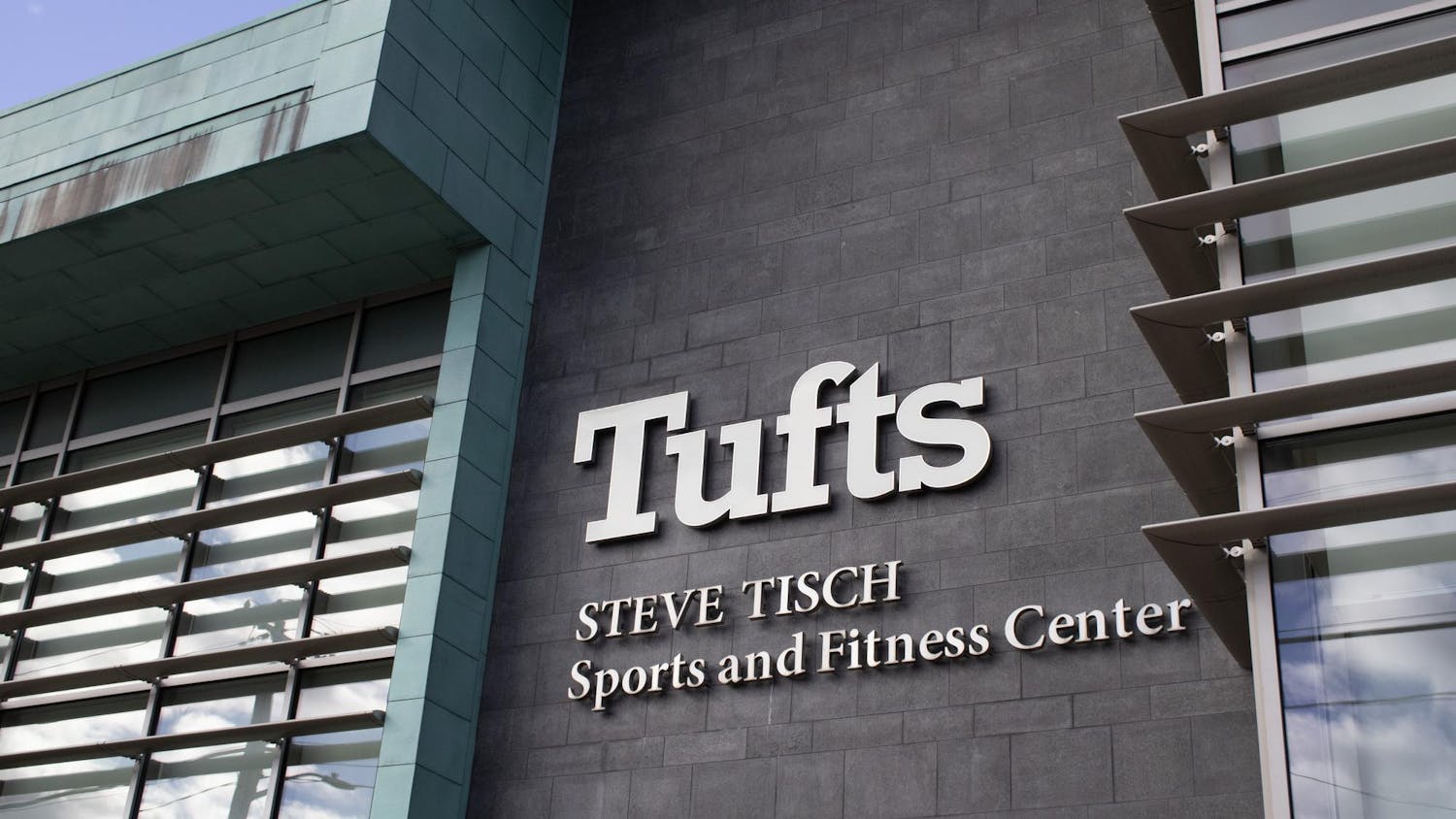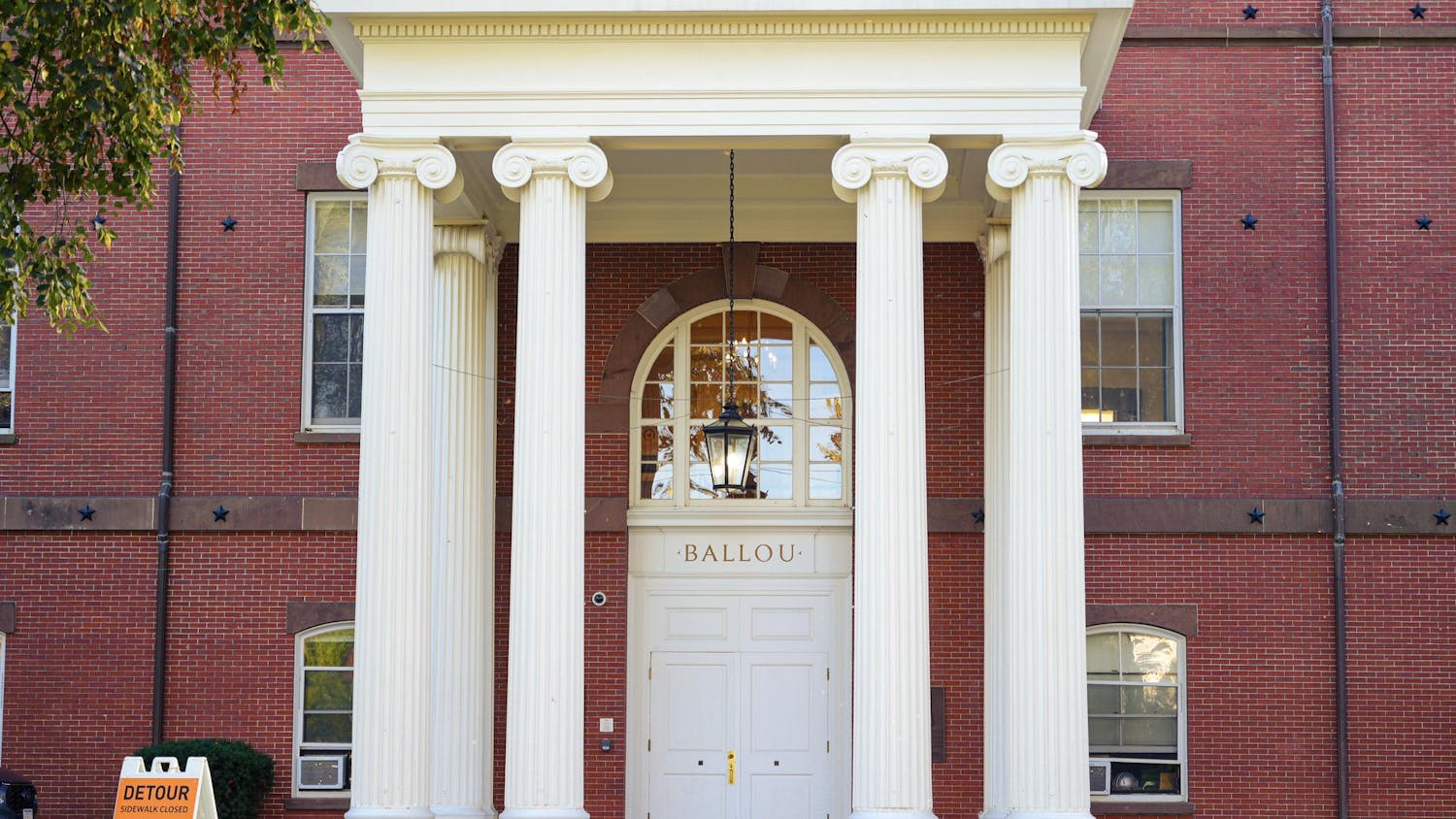Throughout the Class of 2019's time at Tufts, the university claimed many athletic victories, witnessed historic political changes and dealt with an uptick in controversial incidents. To look back on the Class of 2019 and their Tufts careers, the Daily is highlighting the most memorable moments of these past four years.
2015–2016
The 2015–2016 academic year was characterized by changes to academic programs, student activism and progress on several building projects.
In December 2015, University President Anthony Monaco announced the acquisition of the School of the Museum of Fine Arts (SMFA). The School of Arts and Sciences also announced a film and media studies program, a science, technology and society program, a Portuguese minor and an environmental studies minor focused on food and nutrition systems.
Construction on the Science and Engineering Complex (SEC) started, and Tufts continued work on the new Central Energy Plant. The university’s use of non-union construction workers for these projects sparked protests, including the use of mobile billboard trucks sponsored by the Boston Building Trades Council.
Following an uncertain conclusion to Tufts Climate Action (TCA)’s spring sit-in, activism around divestment of the university’s endowment from the fossil fuel industry continued. In November, TCA demonstrated outside of a Board of Trustees meeting, distributing letters to the trustees calling for divestment. TCA collaborated with the Tufts Office of the Provost and the Tufts Institute of the Environment to host a two-day symposium on climate change in the spring, and in May a faculty resolution urging for Tufts to create a plan to reduce carbon emissions was passed in favor of divestment.
Students marched to Porter Square in a demonstration calling for universities to more actively combat racism on campus and in their policies, as part of a “National Day of Action” organized by a group called #TheThreePercent. Organizers also released a list of demands about the treatment of black students and faculty at Tufts, calling for increased representation, an end to increased Tufts University Police Department (TUPD) surveillance of predominantly black events, increases to the Africana Center budget and more support for black, undocumented, international and first-generation students.
Concerns over campus safety loomed over the spring. Incidents of catfishing, spiked drinks and multiple assaults led to an email from the dean of Student Affairs detailing resources for students who have been affected by sexual violence. The end of the semester did not bring an end to safety concerns, as a car fire behind Health Services and bomb threats to several on-campus locations caused several final exams to be postponed.
2016–2017
The election of Donald Trump to the presidency saw a rise in campus tensions and set the tone for the rest of the year.
Hundreds took part in a walkout planned by Tufts United for Immigrant Justice (UIJ) to express support for Tufts’ undocumented students and call for the university to be designated a sanctuary campus. Monaco made an appearance and while he did not explicitly support the sanctuary campus movement, he read a statement reaffirming the university’s commitment to protecting its undocumented students.
The day before election day, the Tufts Observer published an article detailing an act of hazing and sexual assault during a fraternity event. The piece called for the abolition of fraternities, and precipitated a campus-wide movement for the abolition of Greek life.
Though participation in Greek life had risen to nearly a quarter of the student body the previous year, nearly half of the members of the Delta chapter of Alpha Omicron Pi left the sorority early in the fall, following disagreements with the national organization over the chapter’s decision to extend a bid to a transgender woman. The Chi Omega sorority also saw a drop in membership, with members criticizing the national organization and Greek life as an institution.
In response to these calls, the university began investigations and placed a hold on social events and recruitment for all chapters.
Labor continued to be a prominent issue. The university barely avoided a strike while negotiating janitor contracts, and also nearly faced a National Labor Relations Board hearing over unpopular schedule changes. Graduate students in the School of Arts and Sciences voted to unionize, and part-time faculty rallied to support the renegotiation of their contracts.
Graduating senior Benya Kraus was elected Tufts Community Union (TCU) President. The TCU Senate faced controversial resolutions, including an unsuccessful resolution proposed by free speech group Student Advocating for Students calling for changes to the university sexual misconduct policy and a resolution, passed 17-6-8, that called for the university to divest from companies that TCU Senate said were involved in the occupation of Palestinian territories. Tufts celebrated its first Indigenous Peoples’ Day in the fall, a victory for TCU Senate, which had twice passed resolutions in support of the holiday.
Tufts had a number of visitors, including former Secretary of State John Kerry, “NBC Nightly News” anchor Lester Holt, U.S. Senator Tim Kaine and Massachusetts Governor Charlie Baker, whose presence provoked a protest and walkout. Even actor Matt Damon made an appearance, showing up twice at the Steve Tisch Sports and Fitness Center.
At the end of the year, a group known as TuftsLeaks published documents online which included department budgets, the salaries of thousands of staff and faculty and the ID numbers of student employees with salaries listed.
2017–2018
The Class of 2018’s final year saw Tufts make national news on account of a much-publicized resignation from the Fletcher School of Law and Diplomacy’s Board of Advisors, a conclusion to the previous year’s Greek life investigations and new directors at half of the Group of Six centers.
In November 2017, second-year MALD candidate Camilo Caballero published op-eds in the Daily supporting a petition to remove former White House Communications Director Anthony Scaramucci (LA ’86) from the Fletcher School’s Board of Advisors. Scaramucci sent a letter threatening a defamation lawsuit and demanding a public apology as well as the retraction of both op-eds. Scaramucci resigned the next morning.
The fall also saw an end to the Greek life investigations that started the previous year. One fraternity, Pi Delta, chose to dissolve rather than resolve allegations of misconduct. Two fraternities, Delta Upsilon and Zeta Psi, were suspended until September 2018. One fraternity, Theta Delta Chi, was found responsible for multiple violations of university policy and had its recognition revoked without room for appeal until 2027. Three fraternities — Pi Rho, Delta Tau Delta and Theta Chi — were placed on disciplinary probation. One sorority, Chi Omega, was placed on disciplinary probation until December 2018, and the other fraternities and sororities were found to be in good standing with the university.
In another attempt to address the ongoing housing shortage, the university made progress on the Community Housing (CoHo) housing project, which was first suggested by the Residential Strategies Working Group. The project, originally named Capen Village, was approved by the Medford Zoning Board of Appeals on Jan. 11 and opened to juniors and seniors in the fall of 2018.
Rising senior Jacqueline Chen won the election for TCU president against rising senior Adam Rapfogel.
Senate passed a number of resolutions. One called for the pass/fail deadline to be extended to 10 weeks for all students and was affirmed by a faculty vote on Feb. 7, 2018. Senate also unanimously passed a resolution calling for the separation of the Asian American Center and Asian American identity-based housing in order to improve accessibility to the center.
The Group of Six saw major changes. Hope Freeman, Julián Cancino and K. Martinez were hired as center directors for the LGBT, Latino and Women’s Centers, respectively. In February 2018, the university announced the creation of a first-generation student center, the FIRST Resource Center, and in April, Martinez stepped down as Women’s Center director, citing hostility at Tufts on and off campus.
The year saw another victory for labor activists, with Tufts Dining workers voting overwhelmingly to unionize in April 2018.
The end of the year was tinged with mild controversy, however, with some students expressing disappointment over the choice of former DuPont CEO and Tufts alumna Ellen J. Kullman (E ‘78) to deliver the 2018 commencement address. Kullman faced criticisms over violations of environmental regulations that occurred during her tenure as CEO of DuPont.
2018–2019
In their final year at Tufts, members of the Class of 2019 saw sweeping changes at the university and on a national scale, and they experienced events which evidenced a rise in tensions along political lines.
The year began with the initial rollout of CoHo, bringing in 45 new beds to campus for juniors and seniors. By the second semester, 39 more beds were added as the second phase rolled out, with the final phase set for next fall.
The political climate on campus was tense leading up to the midterm elections. On Nov. 1, 2018, less than a week before the midterms, reporters for the Daily discovered posters reading “It’s ok to be white” around campus, covering get-out-the-vote signs placed by JumboVote. The posters have been linked to white nationalists, including former Ku Klux Klan Grand Wizard David Duke.
The ballot questions for that year’s midterm elections were equally important to Tufts, particularly Question 3, which threatened to exclude gender identity from a list of state-held protections. The statewide Yes on 3 campaign, which upheld transgender rights, was campaigned for aggressively on Tufts’ campus, and Question 3 passed in favor of retaining protections based on gender identity.
During the midterm elections, Ayanna Pressley was elected to represent Massachusetts’ 7th District in Congress. Pressley is the first African-American woman to represent Massachusetts on the national stage.
In the second semester, Julián Cancino, the former director of the Latino Center, left Tufts, leaving three of the Group of Six centers without permanent directors. The FIRST Resource Center, aiming to serve first-generation students, opened for its first academic year.
Housing in areas other than CoHo also saw major changes throughout the year. In February, the Office of Residential Life and Learning announced that the SMFA Beacon Street dorms would house only first-years in the coming academic year due to historically large class sizes. Carmichael Hall will house only first-years in the coming year; Harleston Hall will house only sophomores.
In February, Rabbi Naftali Brauer found posters containing anti-Israel messages defacing the Granoff Family Hillel Center. The act was decried as antisemitic and as holding the whole of the Jewish diaspora responsible for the acts of the state of Israel.
Identity-based tensions on campus continued as a message in favor of survivors of sexual assault on the Cannon was painted over with “Trump 2020” and eggings on campus occurred. One of the victims cited “transmisogyny” as the reason for the the egging.
The year also saw rising tensions between dining workers and Tufts, as UNITE HERE Local 26 continued to negotiate for a fair contract. In particular, students and workers held a picket outside of Carmichael Hall with an attendance of over 800 as students shouted slogans in support of the dining workers. Shortly afterward, the dining workers voted to authorize a strike, which was narrowly avoided when Tufts and the workers reached an agreement on April 29.
Editor's note: The 2015–2016, 2016–2017 and 2017–2018 recaps in this article are reprinted from the 2017–2018 Commencement issue of the Daily.
2015–2019: Four years in review

Students enjoy a sunny afternoon on the President's Lawn on April 11, 2017.





